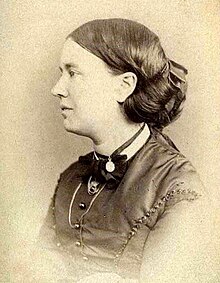Jean Ingelow
| Jean Ingelow | |
|---|---|

Jean Ingelow by Elliott and Fry
|
|
| Born |
17 March 1820 Boston, Lincolnshire, United Kingdom |
| Died | 20 July 1897 (aged 77) Kensington, London, United Kingdom |
| Nationality | English |
| Occupation | Poet and novelist |
Jean Ingelow (17 March 1820 – 20 July 1897), was an English poet and novelist. She also wrote several stories for children.
Born at Boston, Lincolnshire, she was the daughter of William Ingelow, a banker. As a girl she contributed verses and tales to magazines under the pseudonym of Orris, but her first (anonymous) volume, A Rhyming Chronicle of Incidents and Feelings, which came from an established London publisher, did not appear until her thirtieth year. This was called charming by Tennyson, who declared he should like to know the author; they later became friends.
Jean Ingelow followed this book of verse in 1851 with a story, Allerton and Dreux, but it was the publication of her Poems in 1863 which suddenly made her a popular writer. This ran rapidly through numerous editions and was set to music, proving very popular for English domestic entertainment. Her work often focused on religious introspection. In the United States, her poems obtained great public acclaim, and the collection was said to have sold 200,000 copies. In 1867 she edited, with Dora Greenwell, The Story of Doom and other Poems, a collection of poetry for children
At that point Ingelow gave up verse for a while and became industrious as a novelist. Off the Skelligs appeared in 1872, Fated to be Free in 1873, Sarah de Berenger in 1880, and John Jerome in 1886. She also wrote Studies for Stories (1864), Stories told to a Child (1865), Mopsa the Fairy (1869), and other stories for children. Ingelow's children's stories were influenced by Lewis Carroll and George MacDonald.Mopsa the Fairy, about a boy who discovers a nest of fairies and discovers a fairyland while riding on the back of an albatross) was one of her most popular works (it was reprinted in 1927 with illustrations by Dorothy P. Lathrop). Anne Thaxter Eaton, writing in A Critical History of Children's Literature, calls the book "a well-constructed tale", with "charm and a kind of logical make-believe." Her third series of Poems was published in 1885.
Jean Ingelow's last years were spent in Kensington, by which time she had outlived her popularity as a poet. She died in 1897 and was buried in Brompton Cemetery, London.
...
Wikipedia
